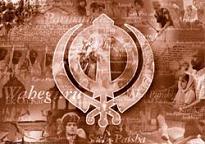

 |
Sikh Missionary Society U.K. (Regd)
10, Featherstone Road.
Southall, Middx, U.K. UB2 5AA
Tel: +44 020 8574
1902
Fax: +44 020 8574
1912
Reg Charity No: 262404
|
 |
|
|---|---|---|---|
|
|
|||
Martyrdom
Aurangzeb ordered that the temples of the Hindus and other non-Moslems should be burnt and destroyed and the people should be forcibly converted to Islam, Those who accepted Islam were given good Jobs and did not have to pay tax, but those who did not accept Islam had to pay double tax and were often caught and butchered on one pretext or another. His plan was to convert all the people of India so he started from one corner of the country and wanted to comb it to the other corner, converting Hindus and all non-Moslems. Orders were issued to start from Kashmir, because the Kashmiri Brahmans were highly educated, and it was thought that if they accepted Islam the work would become easier: Secondly, Kashmir, being surrounded by the Moslem majority areas of Peshawar and Kabul, would not be able to resist long: If it did, the Moslems would wage a Jehad (holy war) against the Hindus of Kashmir and bring a speedy success to the plan.
Sher Afghan, the Emperor's viceroy in Kashmir, set about converting the Kashmiri Hindus at the point of the sword and he massacred thousands of Hindus who refused to accept Islam! The Hindus left their homes and fled. Even Moslems who helped their Hindu neighbours were put to death. He destroyed almost all the Hindu temples and converted them into mosques. He killed the cows, so sacred to the Hindus, threw their flesh into the wells and forced the Hindus to drink water from these wells. Hindus were tied with ropes and forcibly led to the mosques to pray to Rahim (the merciful God) instead of to Rama (god of love).
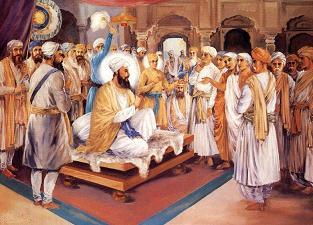 Some
Hindu pandits (learned men) escaped from Kashmire and made up their minds
to seek the help of Guru Tegh Bahadur, who was then at Anandpur in the
Punjab. They reached Amritsar, bathed in the sacred tank of Guru Ram Das,
and after a long and arduous journey reached Anandpur. The Guru listened
to their tale of woe very patiently and began to consider the case. The
Guru's only son, Gobind Rai, aged nine, was then playing in the hall. He
saw that his father was unusually sad, so he went to him and said, "Father
dear, why are you sitting so silent today? What have I done to displease
you?" The Guru embraced his son tenderly, set him on his knee and said,
"My dear son, You are still a child and cannot understand many things.
These people sitting in front of me have come all the way from Kashmir.
The Moslems have burnt their houses and killed their families. They are
asking for help. I have given thought to their request and I feel that,
only a great sacrifice can change the course of events. A man of God must
stand as a rock to protect their religion and freedom."
Some
Hindu pandits (learned men) escaped from Kashmire and made up their minds
to seek the help of Guru Tegh Bahadur, who was then at Anandpur in the
Punjab. They reached Amritsar, bathed in the sacred tank of Guru Ram Das,
and after a long and arduous journey reached Anandpur. The Guru listened
to their tale of woe very patiently and began to consider the case. The
Guru's only son, Gobind Rai, aged nine, was then playing in the hall. He
saw that his father was unusually sad, so he went to him and said, "Father
dear, why are you sitting so silent today? What have I done to displease
you?" The Guru embraced his son tenderly, set him on his knee and said,
"My dear son, You are still a child and cannot understand many things.
These people sitting in front of me have come all the way from Kashmir.
The Moslems have burnt their houses and killed their families. They are
asking for help. I have given thought to their request and I feel that,
only a great sacrifice can change the course of events. A man of God must
stand as a rock to protect their religion and freedom."
The child at once replied, "Dear father, for that purpose who can be more suitable than you ?"
On hearing this, Guru Tegh Bahadur told the Kashmiris to go to Delhi and tell the Emperor that if he could make Guru Tegh Bahadur accept Islam, the whole of India would readily accept it. Pleased at this the pandits lost no time in reaching Delhi. They told the king that they would have no hitch in accepting Islam if he could convince Guru Tegh Bahadur to accept it.
The Emperor was very happy to hear this and summoned the Guru to Delhi. Before he could reach Delhi, the Guru was arrested and brought before the Emperor. The Emperor called a special court, made the Guru sit before him and said, "It is my wish that there should be only one religion in India and, if possible, in the whole world. The Hindu religion is worthless and therefore all the Hindus are sure to suffer in Hell. I pity them and therefore wish to do them it favour. If they accept Islam and repeat the Kalima (Moslem prayer) not only will they go to Heaven, but I will also offer them land, wealth and good jobs. Besides, they will not have to pay tax imposed on the Hindus. If this happens, you will have many more disciples and become a great priest of Islam. I therefore wish you to accept Islam."
"O Emperor," said the Guru, "You and I must walk according to God's will. If it were God's will that there should be only one religion, He would not have allowed the Hindu and the Moslem religions to exist at the same time. He does what pleases Him. Neither you nor I can alter His will."
"God, the most high," said the Emperor, "Appeared to me in a vision and asked me to convert the whole world to Islam. I am, therefore, only obeying God's will."
"God," said the Guru, "Does not speak to anyone in dreams. If God wishes it, He can convert the whole world in a minute because He is all powerful. If you want to do something which He, the all powerful, does not like, then you consider yourself wiser than God."
Upon this the Emperor became red with anger and said, "If you do not embrace Islam, you will be tortured to death."
"Listen O Aurangzeb," replied the Guru. "Try whatever torture your brain can invent, I will never accept Islam. You and I are the servants of God and not His equals. This world is subject to His laws, not yours. Even your prophet, Mohammed, did not impose one faith on the world, why should you do that? The Hindus worship a stone idol and the Moslems worship Sange Aswad (the black stone in Mecca). Is Sange Aswad any better than an idol? I see only a difference in name. You call that stone 'Aswad' and the Hindus call theirs 'Lingham.' Listen, Aurangzeb, Guru Nanak says, 'Death laughs over man's head, but the fool knows it not.' Through pride you have forgotten death. Let people have different ways of worship and different beliefs and do not force your religion on them. The world is like a garden with flowers of different colours and fragrance. It is better as it is, because it is God's own creation."
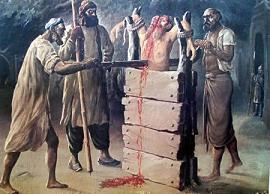 On
hearing this, the Emperor was so angry that his whole body was shaking
and his eyes were red with rage. He ordered that the Guru should be tortured
until he accepted Islam. One of the five Sikhs with the Guru was Bhai Matti
Das. He objected to the punishment and called it unjust and unfair. His
words so annoyed the king that he immediately ordered him to be sawn in
two. Matti Das was bound between two pillars and sawn into two halves from
head to foot. After the martyrdom of Bhai Matti Das, the Guru sent the
other Sikhs away with a message for the young Gobind Rai. One of the Sikhs,
Bhai Gurditta, however. stayed with the Guru.
On
hearing this, the Emperor was so angry that his whole body was shaking
and his eyes were red with rage. He ordered that the Guru should be tortured
until he accepted Islam. One of the five Sikhs with the Guru was Bhai Matti
Das. He objected to the punishment and called it unjust and unfair. His
words so annoyed the king that he immediately ordered him to be sawn in
two. Matti Das was bound between two pillars and sawn into two halves from
head to foot. After the martyrdom of Bhai Matti Das, the Guru sent the
other Sikhs away with a message for the young Gobind Rai. One of the Sikhs,
Bhai Gurditta, however. stayed with the Guru.
The Guru was now put into an iron cage and starved for several days on end. At last Sayed Adam Shah appeared with a warrant for the Guru's execution. The Moslem priest accompanying Adam Shah offered the Guru freedom for the last time if he would accept Islam, but the Guru said, "The Sikh religion is dearer to me than life. I will never abandon my faith for fear of death."
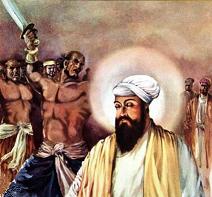 The
Guru was then taken to a well near Chandni Chawk where he washed his face,
sat down under a banyan tree and recited the Japji (the Sikh morning prayer).
By now large and excited crowds of people had assembled to watch the execution.
Moghul soldiers stood on guard with drawn swords a few yards away from
the Guru. At the end of the Japji, Guru Tegh Bahadur bowed to God and sat
down erect with no anxiety or fear on his face. His face looked as calm
as his mind, and with his eyes half closed, he kept repeating : "Waheguru,
Waheguru" (You are wonderful, my Lord). The executioner drew his sword
and, with one stroke, the head of the ninth Guru, Tegh Bahadur, fell to
the ground and rolled in the dust. Blood gushed from his neck, stained
he banyan tree and imparted its colour to the dry leaves of he trees that
brushed against the blood-spattered body of he Guru as if they were anxious
to carry the Guru's message all over the world.
The
Guru was then taken to a well near Chandni Chawk where he washed his face,
sat down under a banyan tree and recited the Japji (the Sikh morning prayer).
By now large and excited crowds of people had assembled to watch the execution.
Moghul soldiers stood on guard with drawn swords a few yards away from
the Guru. At the end of the Japji, Guru Tegh Bahadur bowed to God and sat
down erect with no anxiety or fear on his face. His face looked as calm
as his mind, and with his eyes half closed, he kept repeating : "Waheguru,
Waheguru" (You are wonderful, my Lord). The executioner drew his sword
and, with one stroke, the head of the ninth Guru, Tegh Bahadur, fell to
the ground and rolled in the dust. Blood gushed from his neck, stained
he banyan tree and imparted its colour to the dry leaves of he trees that
brushed against the blood-spattered body of he Guru as if they were anxious
to carry the Guru's message all over the world.
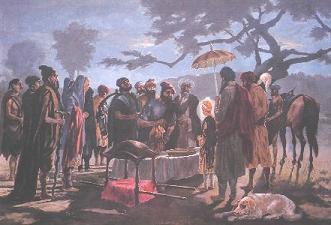 Soon
after the Guru's martyrdom, a fierce storm broke out and a Sikh named Bhai
Jiwan took away the Guru's head to Anandpur, running a race against time
and death. Like the great Athenian runner, Pheidippides, he ran about two
hundred mites in five days and faithfully laid the bloodcovered head before
the nine-year-old Guru Gobind Rai who solemnly cremated it and declared
himself the tenth Guru of the Sikhs.
Soon
after the Guru's martyrdom, a fierce storm broke out and a Sikh named Bhai
Jiwan took away the Guru's head to Anandpur, running a race against time
and death. Like the great Athenian runner, Pheidippides, he ran about two
hundred mites in five days and faithfully laid the bloodcovered head before
the nine-year-old Guru Gobind Rai who solemnly cremated it and declared
himself the tenth Guru of the Sikhs.
Back in Delhi, another Sikh, Lakhi Banjara, came rumbling past Chandni Chawk with his cart. He took the headless body of the Guru to his own house and secretly cremated it by setting fire to the house. Thus passed away the beloved Guru of the Sikhs, paving the way for the foundation of the Khalsa with his blood.
After the storm, the Moghul soldiers found no trace of the Guru except for a small scrap of paper that faithfully stuck to the banyan tree. On it was written :
"Sir deea par sirrar na deea"Since the year of the Guru's martyrdom (1675) he has been remembered as Dharam Di Chadar (the protector of religion).
"He gave his head but not his faith."
"Having broken his clay-pot over the head of the Emperor of Delhi;
He departed to Heaven.
No one in this world has acted like Tegh Bahadur.
The world was in mourning for the death of Tegh Bahadur;
There was weeping for him in this world, but rejoicing in Heaven."
(Guru Gobind Singh)
| Previous Chapter - Guru Ladho Re |
Next Chapter - Selected
Couplets of Guru Tegh Bahadur
|